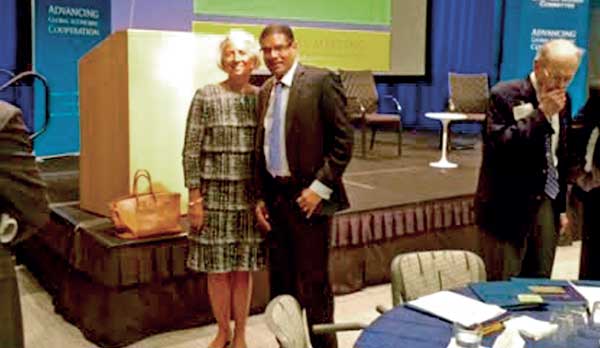01 Feb 2016 - {{hitsCtrl.values.hits}}
 Dinesh Weerakkody with IMF Chief Christian Lagarde at a Bretton Wood session in Washington
Dinesh Weerakkody with IMF Chief Christian Lagarde at a Bretton Wood session in Washington
By Dinesh Weerakkody The darling of the Davos political and financial elite Christian Lagarde, the current International Monetary Fund (IMF) Managing Director, warned the financial elite in Davos of the risks posed to global economic recovery from the reduction of the U.S. Federal Reserve’s monetary stimulus,
falling prices in the eurozone and also that China’s slowdown would have an impact beyond its borders. Therefore, for many emerging markets, 2016 would be a very decisive year. For Sri Lanka, given the tough oversees economic outlook, it’s an either saga of gloom or bloom, but from a more realistic view, for Sri Lanka, it could be a balance of the two.
What happens inside Sri Lanka between now and June will really determine the future direction of Sri Lanka for the next five years.
2016 outlook
In 2016, according to banking sources, interest rates are expected to largely remain at current levels, a corresponding rise in demand for credit in the private sector is therefore expected. In addition to the positive impact on the financial sector, this renewed credit activity for construction activity is expected to stimulate the entire Sri Lankan economy and with Sri Lanka poised to become a regional and an international services hub, there would be new opportunities for publicprivate partnerships. A continued low-interest environment may also spark growth in the property market, with an increase in both commercial real estate financing and consumer housing loans. We would certainly see new life and general buoyancy in capital markets if the regulators can get the right balance.
Sri Lanka’s annual growth pace is expected to pick up from the previous year, boosted by services, stronger manufacturing activity, robust agricultural growth and a pickup in domestic demand. However, like other South Asian countries, Sri Lanka too is vulnerable to political developments in the Middle East, given the reliance of South Asia on imported crude oil. On the other hand, demand from the euro area and the United States, due to low oil prices, could improve in the second half of 2016, which could result in exports from Sri Lanka to grow.
Private sector
As Sri Lankan enterprises improve their governance structures, risk and compliance policies and practices, they will be better positioned to seek alternative sources of funding overseas. Easier access to capital abroad will increase competitive pressure in the domestic banking sector. Furthermore, in light of the move to create an enabling environment for business to create larger and stronger institutions that are wellcapitalized, with strong regional presence, the private sector would derive scale benefits with regard to operational cost and also be able to participate in large projects to a greater degree than now.
Challenge for Sri Lanka
The big challenge for Sri Lanka in 2016 is when Sri Lanka returns to Geneva to answer for ‘collateral damage’, which unfortunately is the futile aspect of war. The other big challenge Sri Lanka is faced with is the significant revenue shortfalls. However, with all the cards in his hand, the President and also the Prime Minister, together should not let lesser ideals stop Sri Lanka becoming the great new Entrepot of the Asia Pacific in its own right now that many Western nations are standing steadfastly on our side.
Then one of the biggest concerns for the world economy is that the Chinese Bubble has Begun to Pop. The Chinese economy that grew by an extraordinary amount over the past few decades is slowing down; it is only a matter of time before China starts tightening its belt for overseas development aid (ODA).
Therefore, if the Chinese economy slips into recession and the troubles persist in Europe, it is very likely to drag down the rest of the world. In addition, declining oil prices could adversely affect many developing countries that depend on worker remittance. So countries like Sri Lanka would need to look elsewhere for low-cost capital to fund their mega infrastructure development projects, to exploit their tourism assets and to export their products and services. (Dinesh Weerakkody is a senior company director and a former bank chairman)
30 Nov 2024 1 hours ago
30 Nov 2024 2 hours ago
29 Nov 2024 29 Nov 2024
29 Nov 2024 29 Nov 2024
29 Nov 2024 29 Nov 2024